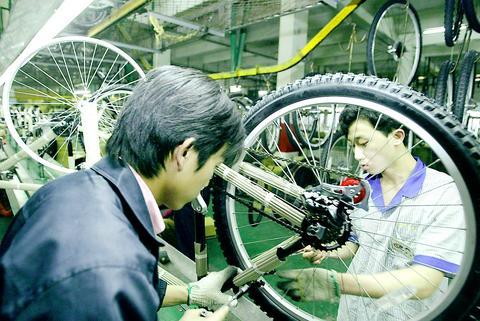In the face of overwhelming competition from Chinese original-equipment manufacturers (OEMs), Taiwanese companies should speed up developing globally recognized brand names to survive, King Liu (
"We started our own brand 18 years ago, when most Taiwanese OEMs were still doing devoted manufacturing," Liu said in a key- note speech to a seminar sponsored by Chinese-language business monthly Common Wealth magazine yesterday.
"But we still feel lonely on this road," he said.

PHOTO: EPA
The nation's top bicycle manufacturer was a key OEM provider for several well-known brands until 1986, when it decided to create its own brand after one of its main foreign clients suddenly shifted orders to another manufacturer.
That crisis forced Giant to remake itself at a time when "made in Taiwan" was a symbol of low-quality products -- but it also proved to be a turning point for the Taichung-based manufacturer, Liu said.
According to international brand consultancy firm Interbrand, Giant has a brand value of US$210 million and ranked as the sixth most valuable brand in the country last year, after Trend Micro, ASUS, Acer, Master Kong and MAXXIS.
Well-known brands make products more marketable, so even when Giant put a US$10,000 price tag on its most luxurious bike, they sold out in a short time, Liu said, adding that the largest benefit of a well-known brand is developing loyal customers who stick to the products.
"When I was in our outlet in Shanghai, a customer told me that Giant bicycles are the most commonly stolen bikes," Liu said, laughing. "Her son has lost seven Giant bikes, yet he still wants a Giant."
Giant has established two manufacturing plants in China since 1993, one in Kunshan, Jiangsu Province, and the other in Pudong near Shanghai.
Even though many local OEMs are aware of the importance of branding after seeing orders being snatched away by cheaper Chinese counterparts, few have taken any practical action and most have just moved their factories to China to save money, Liu said.
"But creating a brand name is the direction to take," he said.
Liu suggested that companies intending to develop their own brands change their company strategy first and work to improve their products on a day-by-day basis to motivate them to innovate.
Eventually, they will come up with unique products, Liu said. Of course, successful products should be combined with good marketing strategies, distribution channels and after-sales service in order to develop a dependable brand, he said.
Liu stressed the importance of the massive Chinese market, saying it is the world's supply hub with companies from all over the world as well as Chinese firms battling to grab a slice of the pie.
Giant sees China as its most important market and it is establishing its third manufacturing plant there in Chengdu, Sichuan Province, in an effort to meet increasing market demand.
"Having our own distinguished brand name is the sharpest weapon [for Taiwanese companies], especially since `made in Taiwan' is now a symbol of higher value-added products," Liu said.

The US dollar was trading at NT$29.7 at 10am today on the Taipei Foreign Exchange, as the New Taiwan dollar gained NT$1.364 from the previous close last week. The NT dollar continued to rise today, after surging 3.07 percent on Friday. After opening at NT$30.91, the NT dollar gained more than NT$1 in just 15 minutes, briefly passing the NT$30 mark. Before the US Department of the Treasury's semi-annual currency report came out, expectations that the NT dollar would keep rising were already building. The NT dollar on Friday closed at NT$31.064, up by NT$0.953 — a 3.07 percent single-day gain. Today,

‘SHORT TERM’: The local currency would likely remain strong in the near term, driven by anticipated US trade pressure, capital inflows and expectations of a US Fed rate cut The US dollar is expected to fall below NT$30 in the near term, as traders anticipate increased pressure from Washington for Taiwan to allow the New Taiwan dollar to appreciate, Cathay United Bank (國泰世華銀行) chief economist Lin Chi-chao (林啟超) said. Following a sharp drop in the greenback against the NT dollar on Friday, Lin told the Central News Agency that the local currency is likely to remain strong in the short term, driven in part by market psychology surrounding anticipated US policy pressure. On Friday, the US dollar fell NT$0.953, or 3.07 percent, closing at NT$31.064 — its lowest level since Jan.

The New Taiwan dollar and Taiwanese stocks surged on signs that trade tensions between the world’s top two economies might start easing and as US tech earnings boosted the outlook of the nation’s semiconductor exports. The NT dollar strengthened as much as 3.8 percent versus the US dollar to 30.815, the biggest intraday gain since January 2011, closing at NT$31.064. The benchmark TAIEX jumped 2.73 percent to outperform the region’s equity gauges. Outlook for global trade improved after China said it is assessing possible trade talks with the US, providing a boost for the nation’s currency and shares. As the NT dollar

The Financial Supervisory Commission (FSC) yesterday met with some of the nation’s largest insurance companies as a skyrocketing New Taiwan dollar piles pressure on their hundreds of billions of dollars in US bond investments. The commission has asked some life insurance firms, among the biggest Asian holders of US debt, to discuss how the rapidly strengthening NT dollar has impacted their operations, people familiar with the matter said. The meeting took place as the NT dollar jumped as much as 5 percent yesterday, its biggest intraday gain in more than three decades. The local currency surged as exporters rushed to